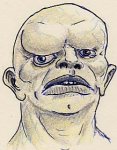Hong: I'm fine with the high Charisma characters with a low-median Comeliness. High Charisma characters will tend to be more attractive that less charasmatic people, but that's not what really bothers me. What bothers me is the fallback of someone playing their character as the epitome of physical beauty (tall, rippling wall of pure manly muscle, or well-endowed, lean, porn-actress types) while not "wasting" a good stat on Cha. That habit tends to come with people who also say "it should be all about how you role-play it, not what the dice say", effectively preventing Charisma from having any real effect in gameplay. It's nothing major, but to me "really hot but bitchy/without much personality" calls for a minimum of 10 Cha. It's more of an anti-munchkin reflex than anything, really.
Plane Sailing: Gruff and surly as a way of explaining low Charisma is fine. Just so long as they live with the fact that people won't like them for it, and will tend to avoid dealing with them as often as they can. Of course, gruff and surly + low Charisma tends to equal whiny more often than not...
Rampant insanity: re: point 2, 18 Charisma does not automatically make you a perky young member of the pep squad. The "fug-ugly, 50 year old man who acts with quiet confidence and has an unspoken air of authority" sounds quite charasmatic there. And I think you're overestimating the voting public here. Both Clinton and Dubya won largely because of personal charisma.
Besides, like I said to Hong, this is not my problem. I agree that Charisma should be a measure of how well you can make other people do what you want, be it via manipulation skills, sheer force of personality, or whatever. I just hold to the fact that people are more likely to do things for good looking people than for plain or unattractive people. This is part of what makes up statistical Cha, and as such should be rolled into it. You'll probably end up with people who's Comliness scores are higher than their total Charisma scores, I don't mind this, but I do mind the fact that if a supermodel-looking character with a 3 Cha on their character sheet smiles at a local and asks them something, with no prior contact, what the NPC will most likely do is totally at odds with what the player has on their character sheet, and that's what I want to cut back. Well, that and the occasional munchkin tendency, but the latter is easy to deal with.
And just to reiterate for everyone. Charisma is about how well you can influence other people's reactions. Good looks make it more likely that you'll have a favorable reaction (all else being equal). If you look at it that way, I think it fits in as an element of Charisma pretty well.



